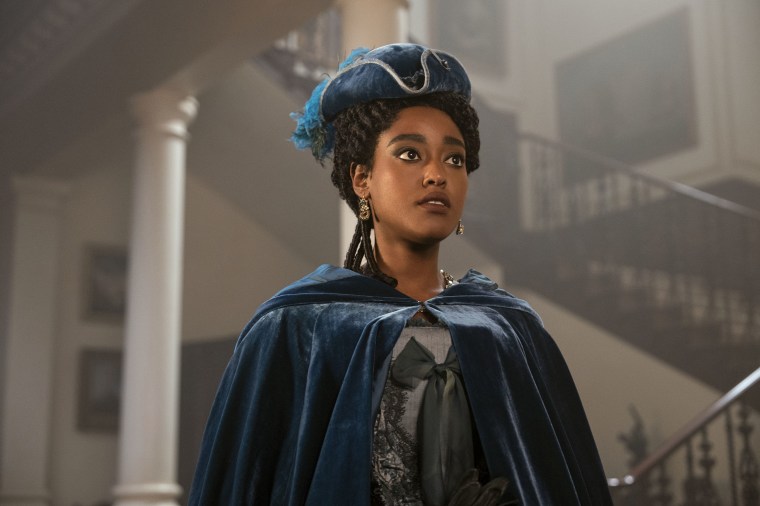Arséma Thomas, who plays a young Lady Agatha Danbury in “Queen Charlotte,” calls her role in the new “Bridgerton” series a type of “emotional reparations.”
In the Shonda Rhimes’ prequel spinoff — which centers on Queen Charlotte’s marriage to King George III and her early days as the first Black queen of England — Thomas says starring in the Regency-era drama provided an opportunity for her to address the oppression of Black women while also allowing them to reclaim their power.
“It’s such a complex situation yet also ... it’s tied so simply to misogynoir,” Thomas tells TODAY.com, referring to the misogyny that Black women face in which their race and gender are intersecting forms of oppression.
“Black women and their relationship to the world around them is so different,” she explains. “One, because of anti-blackness. But also ... it’s the sexism of it all.”
Thomas says even with those types of oppressive systems in place, her character finds a way to fight back.
The actor says Lady Danbury rebukes conventions, choosing to advocate for her own place in society and to not remarry after the husband, Lord Danbury, dies. Thomas says in doing so, her character not only challenges the status quo, but she asserts her agency.
“To be able to play this character, who essentially voluntarily wants to be alone, turns down men, turns down the ‘stability and security’ that a relationship would give during that time and says, ‘I would rather be alone and take that risk,’ is something so liberating and hopefully encouraging to people,” she says.
The American-born actor, whose parents are Nigerian and Ethiopian, said she hopes that Lady Danbury’s actions signal to other women, specifically Black women, “that they’re able to do that, as well know that they can stand on their own.”
Thomas tells TODAY.com that just by reciting Rhimes’ prose, she found empowerment by proxy of her character. She says several of the lines left her thinking, “I have felt this before, and I just didn’t have the words.”
“Finally being able to reclaim power in the room, in those situations, where white people are stripping me of my value and worth and thinking less of me, is almost ... it feels like emotional reparations,” Thomas says. “I get to take my power back from the times when it was lost.”
For example, a young Lady Danbury stands up to Princess Augusta, bargaining information on Charlotte and George’s relationship in exchange for the social opportunity due to her and her husband.
She also reminds Queen Charlotte of her duty, telling her, “You are the first of your kind ... Do you not see what you are meant to do for us?” Her subtle remarks reaffirm that race, class and gender inequalities are still a fundamental issue of the time.
Thomas says it’s “highly important” for these moments — in which Black women are able to talk about issues that affect them while still being their authentic selves — to be seen on the screen.
“Just to be able to touch on so many different aspects of the Black woman narrative. I think for a lot of us the fact that we’re all grouped into a monolith, yet we are all so different,” Thomas says.
“It’s beautiful to be able to see that,” she adds.
